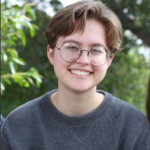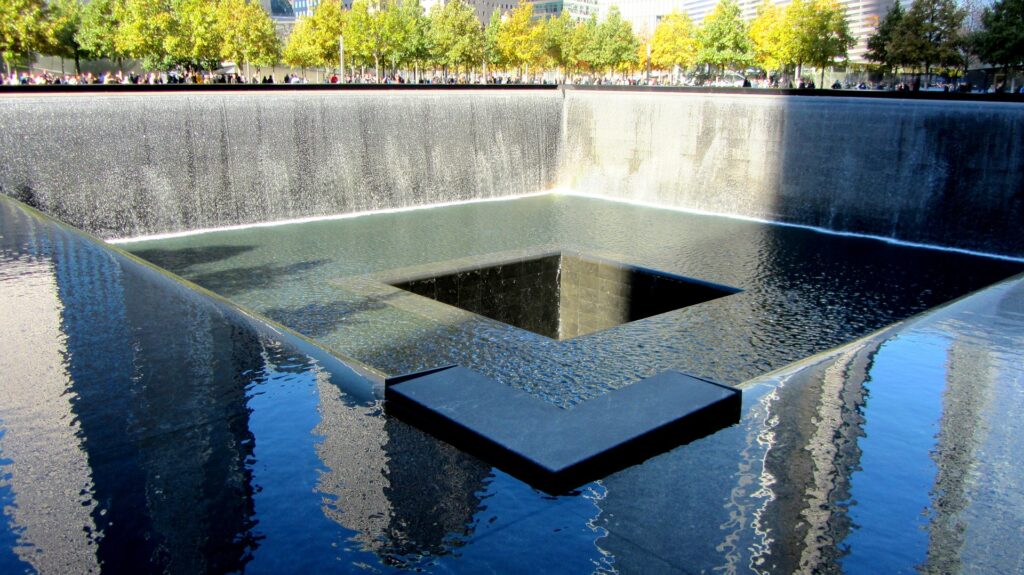Introduction by Martin Meeker
When coming up with ideas for a special newsletter commemorating the 20th anniversary of 9/11, we recognized a blind spot: as a history organization, we typically look backwards into the past to inquire about the memories of individuals, now older, about experiences when they were younger. But what about the young? How do they experience and recall events that might have happened even before they were born, yet are destined to impact their lives going forward? What are they told by their parents and taught by their schools to help them form opinions and make them grapple with events in which they can take no blame and accept no praise? How do they remember key, shared events that they did not experience as conscious, thinking adults? In the passages below, you’ll find a group of our wonderful student employees as they contend with the “experience” of 9/11.
Shannon White

Shannon White is currently a third-year student at UC Berkeley studying Classical Languages. They are an Undergraduate Research Apprentice in the Nemea Center under Professor Kim Shelton and a member of the editing staff for the Berkeley Undergraduate Journal of Classics. Shannon works as a student editor for the Oral History Center.
I was born in April of 2002, several months after 9/11, and as such, I’ve never lived in a world that didn’t have the shadow of such an unprecedented tragedy looming over it. In September of 2001, my mom was six weeks pregnant with me, living in an apartment on campus at the MIT Sloan School of Management, where my dad was getting his master’s degree. I’ve heard the story from her many times over the course of my life: she was watching the news and sat there, in a state of absolute shock, as the towers fell. “I wondered what kind of world I was bringing you into,” she said when I asked her about it again today. My parents have both described their sadness in the wake of September 11, as well as the fear that their home, a major east coast city, would also become the target of an attack. The firsthand accounts of my parents have been so important for my understanding of an event which I did not experience myself but which has had such a lasting impact on the world in which I grew up.
Jordan Harris
Jordan Harris worked at the Oral History Center as an editorial assistant from February 2020 to August 2021. She graduated from UC Berkeley in May 2021 with a bachelor’s degree in English.
I was three years old when 9/11 happened. My mom remembers first hearing about it from a phone call with her mom, who said the Twin Towers were bombed. But my mom didn’t believe any of it, thinking my grandma had just been watching some crazy television show. When she came home after picking up my sister and me from daycare, my dad told her about the planes crashing into the towers. They vividly remember watching the overwhelming news coverage on the television, sitting in shock as they saw bodies falling from the destroyed buildings on the screen.
I don’t think I really understood the impact of 9/11 until I was in middle school. Starting in those years and continuing through high school, there would be annual assemblies to honor the fallen of that day in 2001. As I grew older, every year I became more and more aware of it as this grave, anniversal fixture of American culture, from those assemblies in school to the cable news on TV to the millions of posts on social media, especially as those platforms evolved into ubiquitous fixtures of their own in everyday life. As someone who has no memories from that day since I was so young, it’s a strange thing to think about each year because even though it happened in my lifetime, it still feels far away—an episode of my parents’ lives but not my own.
Ashley Sangyou Kim

Ashley Kim is currently a fourth-year student at UC Berkeley studying Rhetoric. She is an editor for the World Section of Berkeley Political Review (BPR). Ashley works as a student editor for the Oral History Center.
My mom was six months pregnant with me when she saw 9/11 on TV. The first time I heard of this event was when my mother talked about seeing the burning Twin Towers on the news. She told me that she could not believe what was on the screen, and that even the reporters sounded confused at first. Many South Koreans look to America as the ultimate symbol of power, and the fact that something like this could happen was a shock to many people there. After my family immigrated to the US, the first time 9/11 was brought up in school was in sixth grade. My teacher showed the class a documentary detailing how passengers responded to the news that the planes were hijacked. It was a very emotional film, and the individual testimonies stayed with me for a while. Only a couple of years ago in college did I learn how 9/11 had an enormous impact on U.S. domestic and foreign policy. To be honest, I feel like I only know the tip of the iceberg when it comes to how 9/11 changed the world.
Ricky Noel
Ricky J. Noel worked at the Oral History Center as a student editor. A recent graduate of UC Berkeley, he majored in history with a Latin American concentration.
For those of us born in the very late 90s, 9/11 was something that occurred in our lifetime, but we never quite understood the true gravity or impact of the tragedy until much later in life. Every anniversary of the tragedy was marked on our calendars but I personally did not learn the details of what had occurred until high school. Through various documentaries and podcasts I finally learned the full extent of what occurred that day and I finally understood how this terrible tragedy must have affected the people living through it. The idea that something like this could happen within the United States must have been a terrifying prospect. It set the stage for the United States — and by extension other countries — to become a lot more locked down in terms of how we moved around the world. The event changed everyday simple aspects of American life. Before 9/11 you could wait at the gate at the airport for a loved one, traveling was easier, and Afghanistan and Iraq were not constantly present in the back of your mind. Coming up on twenty years after the attack, 9/11 still has a conscious impact on America. It’s a tragedy that has continued to reverberate through the years, even through small changes that we have all become used to as part of everyday life.
